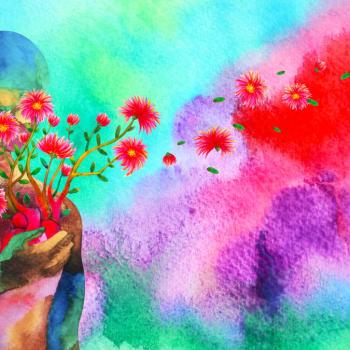I was speaking with a few friends of mine who are spiritual directors recently, and we were talking about the work they do accompanying people who seek to draw closer to God.
If you are not familiar with spiritual direction, it is a ministry of interactive care, in which a person supports another in the journey into deeper intimacy with God. A spiritual director does not “direct” in the sense of giving orders, but may provide a sense of orientation or calibration, helping to keep the conversation (and the prayer) always grounded in divine love.
In the Christian tradition, it is said that the only true spiritual director is the Holy Spirit. The Spirit, who is poured into each of our hearts, provides the ultimate “compass” for guiding us more and more fully and deeply into the felicity of God’s presence, love, mercy and care. Thus, the human spiritual director functions like a midwife, someone there to provide care and support and guidance, but always with a humble recognition that there role is to hold a sacred space where the intimacy of God’s love may emerge more fully in the heart of the seeker.
So back to the conversation with my friends who have a ministry of spiritual direction. One of them, I can’t recall who, suggested that ultimately in spiritual direction there are only two questions:
- Who is God?
- Who are you?
If you’d like, you can pose these questions each in the light of the other:
- Who is God, to you?
- Who are you, in relation to God?
Just as you cannot have a healthy and sustainable mature human relationship without two human beings who are at least minimally capable of autonomy and care for another, likewise anyone hoping for a meaningful relationship with God must grapple with both of these questions, for their sense of self — and their sense of God, what is sometimes called their “image of God” — will shape and impact how they understand and experience their spiritual journey.
Enjoy reading this blog?
Click here to become a patron.
If you believe God is punishing and wrathful, what kind of relationship will you have with God? Probably one that is very guarded and self-armored, and you might subconsciously be doing all you can to keep God at arm’s length. Conversely, if deep down inside you see yourself as fundamentally unloveable, that will also constrict your capacity to truly be vulnerable and available for God’s love to flow into your life.
When my friend made this simple statement, I nodded in agreement, for my journey both in receiving spiritual direction and in serving as a spiritual director for others, these two questions keep arising again and again. Even someone with a basically mature sense of self and a strong image of God-as-Love will still find that the deep work of prayer, meditation and contemplation will continually yield new insights into places where we need healing, and our image of God might need reconfiguring.
These questions are not just for the ministry of spiritual direction. Indeed, I would suggest that anyone who wants to explore contemplative spirituality and the mystical life would do well to reflect on these questions, intentionally and often.
If you think you are being called into intimacy with God — even into the beatitude of union with God — then take the time to ponder these questions: Who is this God who is calling you? How do you experience God? What do you know about God? What are some things you may have been told about God (in childhood, or even more recently) that simply don’t ring true? Are you afraid of God? Is it possible to trust God, and how does that play out in your life? Where does your image of God need to be deepened, or healed, or transformed?

Likewise, who are the “you” that God is calling? How does God see you? Is God’s sense of who you are consistent with your self-image? Is there something difficult or painful in your life that you are running away from, or not quite ready to face? Do you need the support of others, like a therapist (note: spiritual direction is not the same thing as therapy, and most spiritual directors are trained to make referrals when a person appears to be in need of therapeutic care)? Do you have one or more active addictions, and if so, are you willing to take the steps needed to enter into recovery? Are any of your relationships broken (including your relationship with yourself)? Are you happy? Peaceful? Joyful? If not, what resources can you tap into to bring more felicity, serenity and joy into your life? Where do you hurt (spiritually as well as physically)? What do you want — what do you really want, at the deepest level of your heart? What sacrifices are you willing to make in order to get what you want?
These questions are just a start, but all of them (the “God” questions and the “self” questions) are meant to inspire discernment — thoughtful, mindful, heart-centered reflection on where we are, and where we believe we are called to go.
The mystical life is an invitation into deep mystery, which makes sense, for on a very real level, both God and self ultimately are mysteries to ourselves. We can learn much about who we are, and how we understand God, and put those two understandings together to nurture a healthy and meaningful relationship between self and God, even to the point of experiencing union with God. But the nature of mystical spirituality is such that, no matter how deep our understanding might be, it will always be suspended over the loving abyss of infinite unknowing. Some people might find that image unsettling or even scary. But for those who have a sense of God as love and the presence of God as a merciful and caring presence, even the abyss of the mystery is not unsafe, but rather simply an infinite forum for the most intimate of encounters: between the loving Creator and the beloved creature.
Enjoy reading this blog?
Click here to become a patron.














